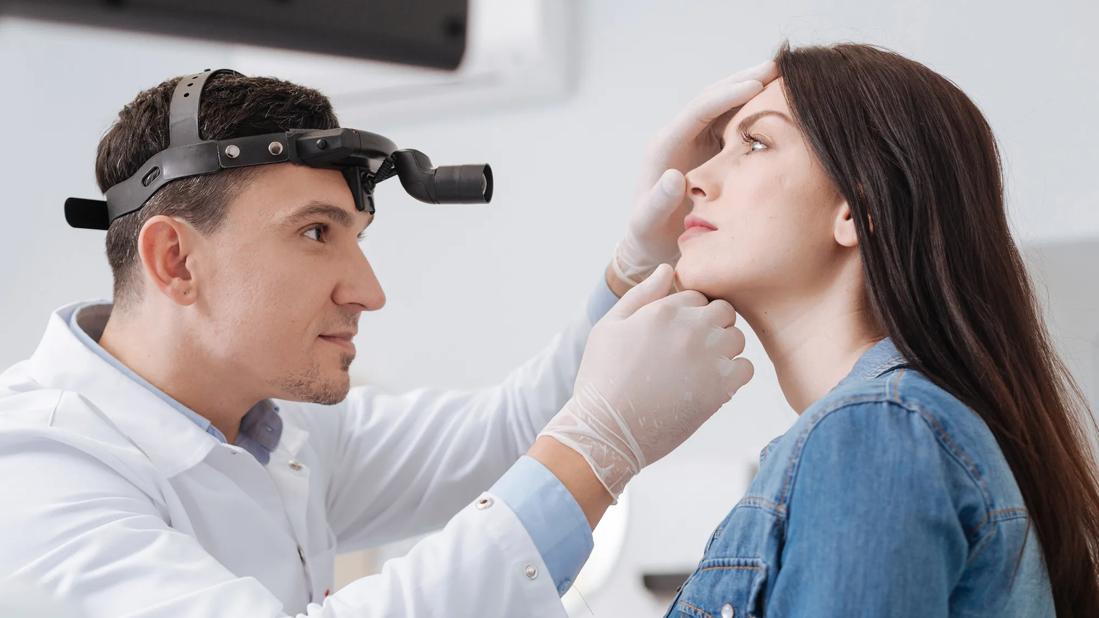These growths inside the nose don’t cause cancer, but it’s important to make sure you get a proper diagnosis

Image content: This image is available to view online.
View image online (https://assets.clevelandclinic.org/transform/9330f353-6a5a-4285-816a-303094007a0b/doc-checking-nasal-passages-patient-673336174)
Healthcare provider examining patient's nose
You’ve been diagnosed with nasal polyps. Now what? Do you need to worry about the possibility that they could turn into cancer?
Advertisement
Cleveland Clinic is a non-profit academic medical center. Advertising on our site helps support our mission. We do not endorse non-Cleveland Clinic products or services. Policy
Otolaryngologist Troy Woodard, MD, explains what you need to know.
Nasal polyps are small growths in the nose that are caused by chronic inflammation. They’re benign tumors, which means they don’t turn into cancer.
Understandably, though, the word “tumor” can cause some confusion and concern. Many of us associate that word with cancer. But medically, a tumor is any solid mass of tissue that forms when abnormal cells group together. And many types of tumors, like nasal polyps, aren’t cancerous.
Nasal polyps are common. Cancerous nasal tumors, on the other hand, are fairly rare. The American Cancer Society reports that cancers of the nasal cavity and paranasal sinuses make up less than 1% of all cancers in the U.S.
“The vast majority of growths in the nose are benign polyps,” Dr. Woodard confirms. "Only a very small portion is cancerous.”
Here’s the thing: There’s no way to tell what you’re dealing with on your own. Plus, nasal polyps typically start growing high up in the nasal cavity, where they can’t be seen by the naked eye. That means that only a healthcare provider can definitively tell you what you’re dealing with.
In short, if you’ve been diagnosed with nasal polyps, you don’t need to worry about them turning into cancer. But if you’re experiencing nasal symptoms and haven’t yet seen a provider, it’s important to do so.
Advertisement
If you feel some sort of growth in your nasal passage, don’t jump to conclusions. Nasal polyps and cancerous tumors aren’t the only two possibilities. You could also be feeling:
“It could be a lot of different things,” Dr. Woodard points out. “So, if you don’t yet have a diagnosis, you really need to be checked out by a healthcare provider who can take a look and determine what’s causing the problem.”
Nasal polyps aren’t cancerous. But they can still affect your quality of life, especially if your symptoms don’t improve or get worse.
Talk to a healthcare provider if your nasal polyps are causing symptoms like:
They can help you figure out how to best manage your nasal polyps, like with medication or surgery.
Other symptoms, like facial pain and frequent nosebleeds, aren’t symptoms of nasal polyps. But they can be signs of other issues in your nasal passages — so don’t ignore them. Make an appointment with a primary care provider or an otolaryngologist (also called an ENT).
“Many nasal problems can cause the same symptoms,” Dr. Woodard says, “so you’ll need to see a doctor who can use an endoscope — a small telescope in the nose — to figure out what’s actually causing your symptoms.”
Advertisement

Sign up for our Health Essentials emails for expert guidance on nutrition, fitness, sleep, skin care and more.
Learn more about our editorial process.
Advertisement
Avoid irritants and allergens, run a humidifier, try saline rinses and ask a healthcare provider about medications
Allergies, postnasal drip, asthma or reflux could be to blame for a cough that won’t quit
Correct positioning is one of the keys to getting the best results
Research consistently shows that soy-based foods do not increase your risk of breast cancer
Lung cancer and treatment can take its toll, but support is available to help you live well
Getting your treatment plan just right can take some fine-tuning, but the appointments will taper off
Side effects like nausea and fatigue are common, but there are ways to feel better
Any fever, especially one of 100.5 degrees Fahrenheit or higher, should trigger a call to your oncologist — and maybe a trip to the ER
Although it could be used as a moisturizer, this new trend is not recommended
Communicating clear limits helps protect your time, energy and emotional well-being
High cholesterol can be genetic, but testing and treatment can lower your heart disease risk